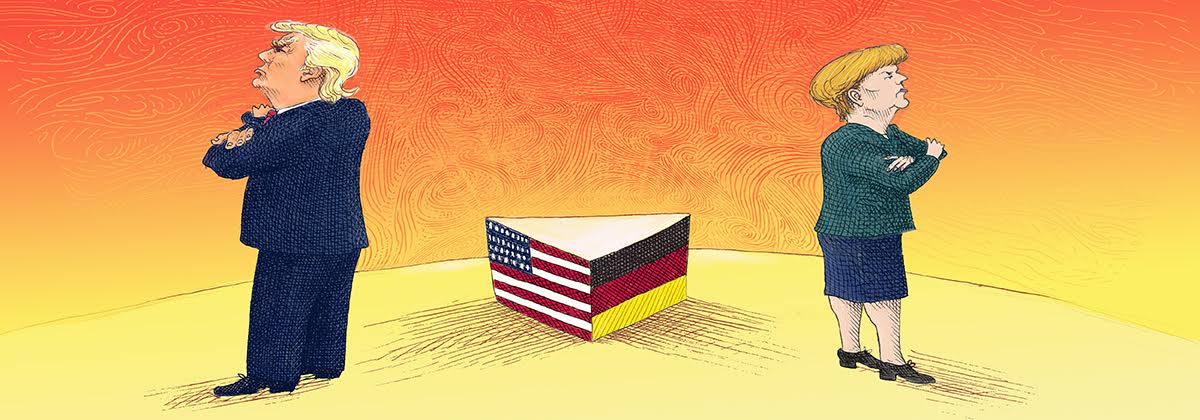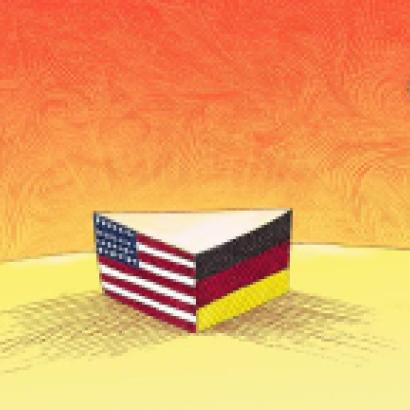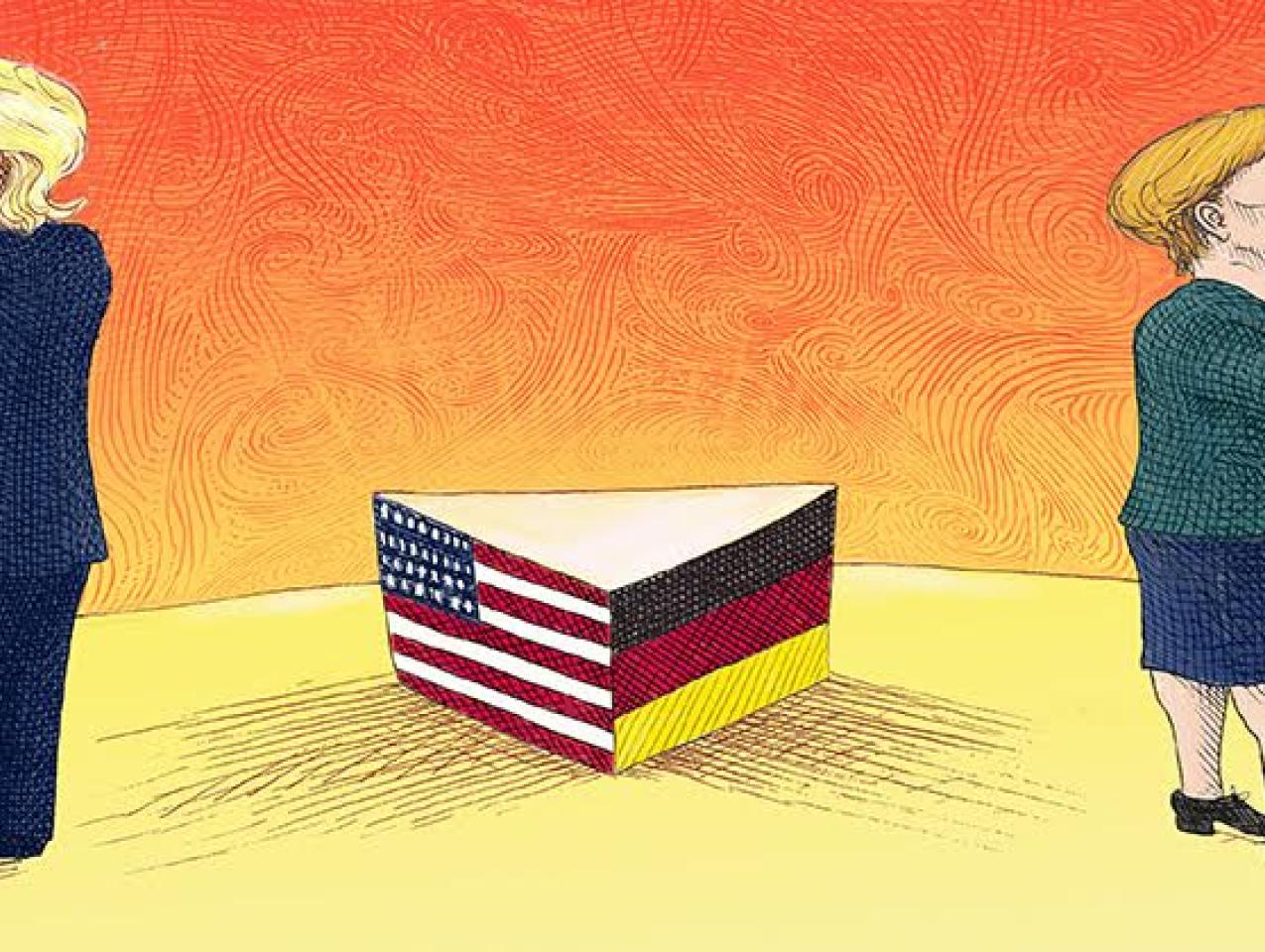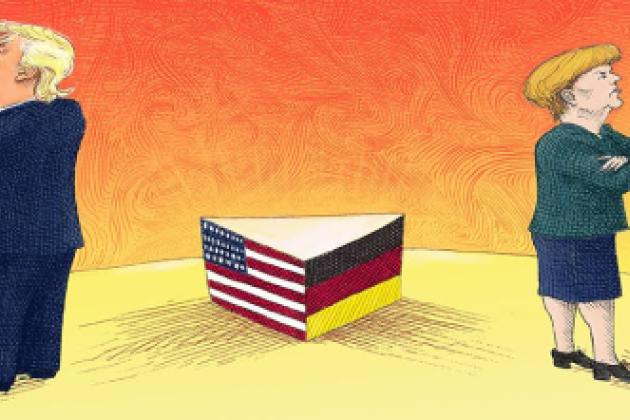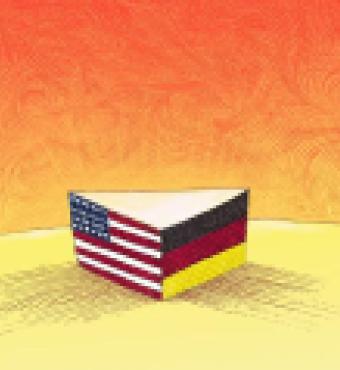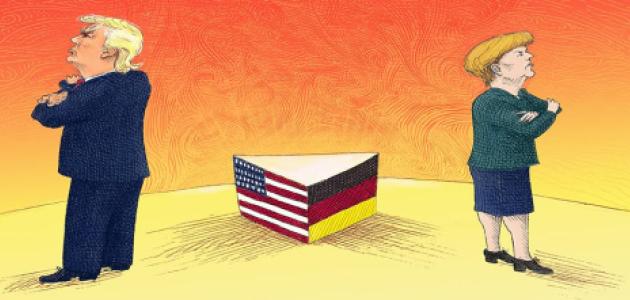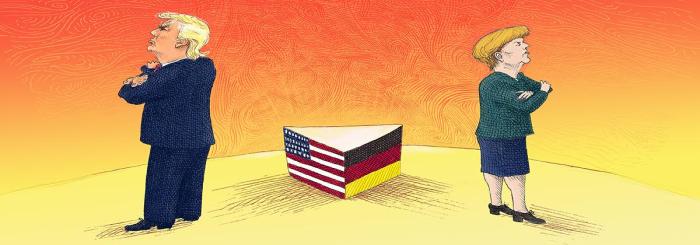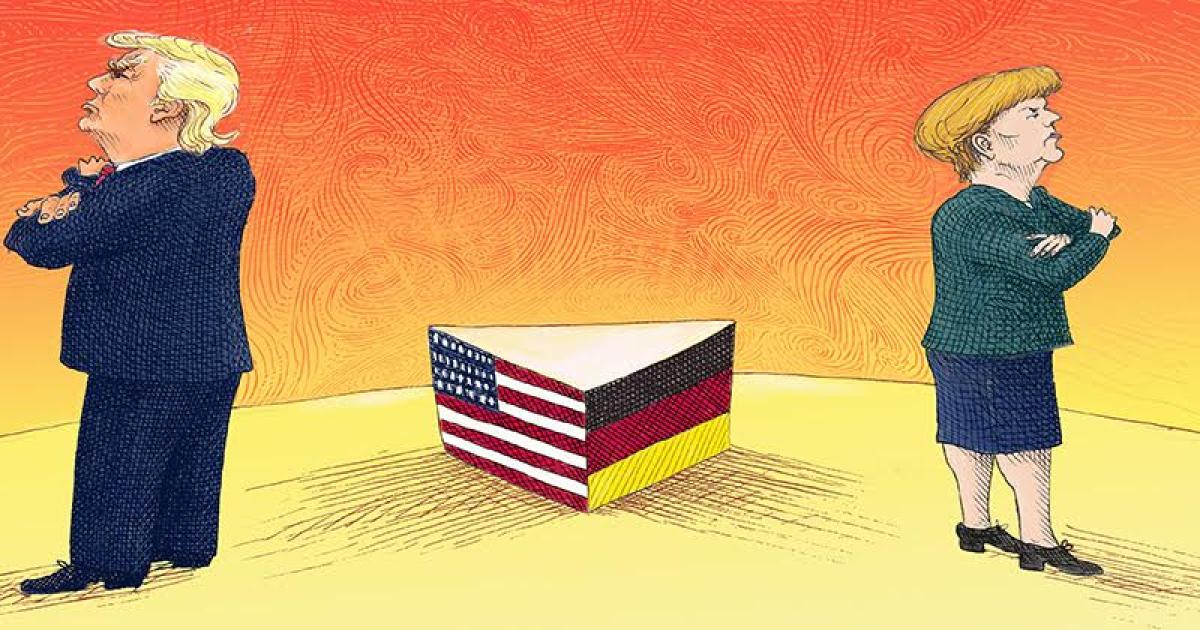The vitality of relations between Berlin and Washington has long served as a litmus test for the overall health of the Atlantic alliance, which makes the current rhetorical skirmishing between the principals all the more troublesome. President Trump has condemned Germany’s high trade surplus and its low defense budget as “very bad,” while Chancellor Merkel has responded, indirectly, in the Christian Democrat’s electoral platform. In 2013, that document had described the United States as Germany’s “most important friend” outside of Europe. But in 2017, that declaration of amicability is demoted to an appreciation of the “most important partner.” Germany and the United States are still on the same page, evidently, but the tone is noticeably cooler. Are we frenemies now?
The chilly relations between President and Chancellor contrast sharply with the burgeoning bromance of Trump and newly elected President Macron of France. One photograph even showed Macron with his arm around his American colleague’s shoulder, a big smile on his face. This fraternal bonding was by no means predictable, since Trump had all but given an explicit endorsement to Macron’s electoral rival, Marine Le Pen. Yet when Trump visited Paris for Bastille Day, all seemed forgiven. Surely the military and nationalist atmosphere—unimaginable in contemporary Berlin with its pacifism and fraught relationship to the national past—that pervaded the celebrations may have appealed to Trump’s personal predispositions. But so did the centenary commemoration of the American entry into the First World War.
Trump and Merkel versus Trump and Macron: reflecting on the contrasting chemistries can shed some light on the vexing questions around the administration’s relations to Europe. Of course, some of the differences may be just a matter of personality and biography: Macron, like Trump, is an outsider, abruptly and unexpectedly catapulted into highest office. Moreover, the grandeur of Paris must certainly have appealed more to the American President than did Hamburg, which, during his attendance at the G-20 meeting, was ravaged by violent protests and an extensive breakdown of law and order.
Yet in addition to these subjective and cultural aspects, one hard fact differentiates Trump’s relations to the leaders of France and Germany: Macron has just won an election, and decisively so, while Merkel is heading into the Bundestag elections in September. In Germany, where anti-Trump sentiment is strong, and a good dose of anti-Americanism always present, the dyed-in-the-wool politician Merkel will continue to make it clear to her electorate that she would not feel gemütlich in the Trump White House. Any photograph of her smiling with the President will lose her votes. Meanwhile, her Social Democratic opponent Martin Schulz will do his best to tie her to Trump so that he can turbocharge his campaign against Merkel by pretending to run against Washington. Odds are that Merkel will be able to win that game.
The German electoral calculus has changed markedly in the past year. Last fall, Merkel’s prospects were not at all rosy. In the aftermath of her refugee policy, which brought more than a million de facto immigrants into Germany, dissatisfaction rose across the political spectrum, particularly evident however in the rise of the “Alternative for Germany,” (AfD) a new right-wing party, originally focused on the Euro crisis but increasingly opposed to Merkel’s open borders. The AfD scored well in a series of regional elections, both in the western and eastern parts of the formerly divided country, and culminating in a strong showing in the local Berlin election. A plausible prognosis emerged that the pull of voters to the right would not produce a new right-wing majority, but that, instead, weakening Merkel from the right, it would lead to a left-wing governing coalition, composed of the Social Democrats, the Greens, and the “Left Party,” i.e. the former Communists—the so-called “red-red-green” combination.
Yet by the spring of 2017, the tide had shifted, and Merkel’s Christian Democrats were able to defeat the Social Democrats, most definitively in the largest regional election in the state of North Rhine-Westphalia in May. Furthermore Schulz failed to be as successful a candidate as he had initially been touted to be. While it is still two months until the September elections, and one has learned to be cautious with predictions, Merkel’s prospects look strong, surely much stronger than they did a year ago—and the United States should welcome that.
Despite the unmistakable irritations in the personal relations between Trump and Merkel, a strong showing by Merkel’s Christian Democrats in the September election would be positive for trans-Atlantic relations. If that seems counterintuitive, it is vital to consider the most probable alternative, a left-wing coalition government in Berlin (that “red-red-green” option). Such a government would resist increasing Germany’s defense budget participation in NATO, which Trump has called for—just as it would not pursue any accommodation to the Trump administration’s positions on climate or trade. A German foreign minister from the former Communist camp, highly probable in such a coalition, would be delighted to watch relations between the United States and Germany deteriorate. And the U.S. Democrats currently worried about some secret Trump ties to Moscow will end up facing very real problems if a bona fide Putinversteher—an apologist for Putin—takes over Berlin’s foreign policy.
Fortunately for the United States and for Germany, that scenario is less likely than a Merkel victory. If the Social Democrats do poorly enough, there might even be a chance for a coalition of the Christian Democrats with the small free-market liberal party, which could produce tax cuts. Be that as it may, underneath these electoral political considerations and aside from personality differences, some genuine and objective differences and competing perspectives burden U.S.-German relations and need tending.
A Relationship with Mutual Benefits
Strong relations between Germany and the United States have not only been a cornerstone of the Atlantic alliance and international order for decades. They are also very much in the national interest of each country. For the United States, Germany provides access to a major economy and the vital center of the European Union, especially in the wake of Brexit. Moreover, even though Germany is no longer the front-line state of the Cold War era, its geography makes it strategically central to European security, a matter of no small interest to the United States.
For Germany, with its considerable dependence on international trade, access to the one genuine superpower, not to mention the American domestic market, is a great advantage. Furthermore, an American umbrella, particularly in the form of NATO, protects Germany from the anxieties its European neighbors experience whenever they worry about a too powerful Berlin. Memories of World War II are always just below the surface. During the Greek crisis, references to the Nazi past erupted very quickly; that sort of painful attack would happen even more frequently were the U.S. role in Europe to diminish even further and the smaller European countries had to face German power directly. As the old quip has it, an American dominated NATO protects Europe, externally from Russia and internally from Germany.
International Security
It is urgent to distinguish between the highly polarized U.S. political and media narrative about Trump and Russia and the very real efforts by Moscow to reclaim a sphere of influence in Central-Eastern Europe. No one should doubt that Crimea and eastern Ukraine were only the first steps in a revisionist strategy that will be pursued by the Kremlin. In his own distinctive manner, Trump first held back from supporting NATO and Article 5 in order to exercise negotiating leverage, but he has come around to embrace them both. In retrospect, his challenge seems to have been intended to probe whether the Europeans might be goaded into taking their own defense seriously. Call it the art of the political deal. It is therefore not surprising that he has displayed a positive predisposition to France, with its relatively strong military, or, for that matter, that his Warsaw speech addressed the Polish national will for self-defense against external enemies—by which he clearly meant both ISIS and Putinist expansionism.
Where does Germany figure in this security calculation? An uncompromising anti-military sentiment defines modern German culture. German participation in the international coalition in Afghanistan was often controversial, half-hearted, and constrained by limitations imposed by the Bundestag. Former Foreign Minister Frank-Walter Steinmeier, now the German President, attacked NATO exercises in Poland as “saber rattling.”
While the Atlanticist community fretted over Trump’s hesitations regarding Article 5, the real question is whether Germany would be willing and able—that is, have the will and have the forces—to respond to an attack against NATO members to its east. Imagine a scenario in which the United States were to be preoccupied with events in the Pacific, perhaps concerning North Korea, and Moscow were to take advantage of such a crisis as an opportunity to move its forces into the Baltics or Poland, repeating the Crimea or the Ukraine scenarios. Without American cover, would Germany be willing to deploy its military, the Bundeswehr, to meet its own Article 5 obligation and fight to defend Warsaw against Russian troops? A negative answer would not be implausible. Perhaps the tougher questions are: Would the Bundeswehr fight to defend Berlin against those same troops? Would a pacifist German leadership even permit it to fight?
Climate and Energy Policy
Trump’s rejection of the Paris Accords combined with his endorsement of fossil fuel development in the United States put him doubly at odds with Merkel. At stake is simultaneously the status of an international agreement, which, from a German point of view, has absolute priority over any national (or nationalist) agenda, and the imperative of developing alternative energy sources. On that latter point, one should note that Merkel’s own decision by fiat to take Germany out of nuclear energy was at least as peremptory as Trump’s rejection of Paris—even more so, since her anti-nuclear choice represented an abrupt policy about-face after Fukushima, while Trump acted consistently with his campaign promises.
Here, too, it is worth looking under the surface politics. Although the conflict over energy policy has been presented as a competition between Merkel’s environmentalist virtue and Trump’s fossil fuel vice, the real issue involves the organization of access to the European energy market. While the G-20 conclusion left the United States alone in its withdrawal from Paris, the energy communiqué did include a statement that America will “work closely with other countries to help them access and use fossil fuels more cleanly and efficiently.” That statement, which points to U.S. aspirations to supply the European market, can only be understood in the context of German advocacy for Nord Stream 2, a second pipeline to bring Russian liquid natural gas to Europe, and to do so in a way that disadvantages eastern Europe and Ukraine, while making them more vulnerable to Russian energy blackmail. Especially after Merkel’s decision against nuclear, the Europeans, and above all the Germans, will continue to depend on fossil fuel, and Nord Stream 2 will bind the European market to Russian production.
Energy policy in Europe is inseparable from security policy. Increasing European dependency on Russian energy sources undermines European independence and represents a strategy designed to diminish American influence.
Trade Differences
Trump’s de facto critique of Germany’s security policy can reasonably be described as conservative in its advocacy of a stronger defense commitment. His partisanship for fossil fuels against the Paris Accords and Merkel’s own anti-nuclear “energy turn” has an equally conservative character. However, his argument regarding the trade imbalance and the role of the Euro in advantaging the German economy has a distinctively liberal or even left-wing ring to it. It echoes objections to the harsh austerity regime that Berlin prescribed for Greece, the undervaluing of German exports thanks to the common currency, and the downward pressure on wages of German workers that contributes to low domestic consumption. Some of these arguments were even made by the prior U.S. Treasury Secretary, Timothy Geithner. That they resonate with aspects of Trump’s economic agenda implies a connection between high unemployment rates in the southern parts of the Eurozone and pockets of unemployment (minority youth) or underemployment in the United States. In both cases, there is a need for more and better jobs. When all is said and done, Trump’s positions on German economic policy, which go far beyond the single question of the trade imbalance, pick up on aspects of the criticism, more often than not from the left, directed against the austerity agenda associated with Merkel and her Finance Minister Wolfgang Schäuble.
However the Trump administration resolves its trade policy and its invocations of an economic nationalism, this simultaneity of conservative security and energy policies with a progressive rhetoric (at least) on trade and jobs is worth noting. Even during the presidential campaign, Trump was never ideologically one-dimensional or by any means the most consistently conservative candidate. On the contrary, he distinguished himself from the Republican competitors, for example, by insisting that he would not touch the major entitlement programs, a position more typically associated with the other side of the aisle. It is not at all surprising that various Republicans did not and still do not recognize Trump as one of their own, in part because of his hybrid political instincts, combining right-wing and left-wing positions in ways that are eclectic and expedient or, phrased more positively, politically pragmatic.
Beyond Right and Left, Beyond East and West
This ability to draw from across the political spectrum is symptomatic of a more general obsolescence of traditional right/left distinctions, characteristic of this current era of populism. It is also indicative of the rapid loosening of allegiances to traditional political parties, which used to be the guardians of ideological purity. Gone are the mainstays of the party landscapes in France and Italy; the Labor Party in the Netherlands was the big loser in the recent election there; new populist parties have arisen, more or less on the right in Poland and Hungary, and more or less on the left in Spain and Greece. And the most recent U.S. presidential campaign involved a revolt against both the Democrat and Republican establishment and leaders. .
Amid this international political flux, Merkel occupies an intriguing position. Her political strength derives no doubt from her capacity to radiate a sense of stability and existential security to a German electorate that generally dislikes change. To the extent that she has come to be represented in the press as the not-Trump (the way Obama got lots of mileage for being the not-Bush), she has the inside track toward her fourth term. Yet she too participates in this environment of political metamorphoses. She came up through the ranks to lead the Christian Democrats, Germany’s version of a conservative party, but her conservative credentials are frequently doubted.
Clever wags have labeled Merkel Germany’s best Social Democratic Chancellor because of her gradual but inexorable drift to the left, embracing a minimum wage law, rejecting nuclear energy, overseeing the abolition universal military service, opening the borders to uncontrolled mass immigration, and paving the way to gay marriage; all that from the allegedly conservative leader of the Christian Democratic Union. She stands to the right but steers toward the left, and this mixed right-left political character, interestingly enough, is not unlike Trump’s own profile. In that hybrid political space between left and right, Merkel and Trump may yet discover some solid ground for cooperation—but only after the September elections. Before then, fraternizing with the frenemy will be verboten.
With an eye to electoral politics, Merkel will want to keep Trump at more than arm’s length. But this is not just personal and goes beyond the September vote. In response to Trump’s characterization of German positions as “very bad” for the United States, Merkel remarked insightfully, “The times in which we could completely depend on others are, to a certain extent over. […] We Europeans truly have to take our fate into our own hands.”
Perhaps that might not be all bad. Following through on that newly discovered sense of responsibility for oneself could mean finally responding to Washington’s long-standing expectation that Europeans do more for their own security; Trump would presumably welcome such a development as cost-sharing for NATO. If however taking their fate into their own hands means carving out a European “third way” between the United States and Russia—a deeply ingrained temptation in the German political imagination—it could lead to something like the neutralization of Germany, reminiscent of the “Finlandization” model of the Cold War
Such an outcome would be welcome in Moscow now because it would necessarily involve a rollback of U.S. influence. If Germany were to be in play, all of Europe would be as well, and losing Germany to Russian influence could significantly reduce American influence and strategic ability. Yet while Germany, with its particular cultural and historical burdens, might very well indulge itself by imagining such a third way, other countries, notably Poland and France, will have no interest in severing their ties to the West and to the United States—and it was precisely in Warsaw and Paris, the capitals of two self-confident nations, that Trump successfully displayed the American commitment to Europe.







